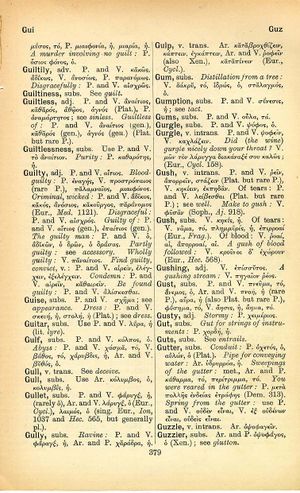guilty: Difference between revisions
From LSJ
οὐ δικαίως θάνατον ἔχθουσιν βροτοί, ὅσπερ μέγιστον ῥῦμα τῶν πολλῶν κακῶν → unjustly men hate death, which is the greatest defence against their many ills | men are not right in hating death, which is the greatest succour from our many ills
m (Woodhouse1 replacement) |
mNo edit summary |
||
| Line 5: | Line 5: | ||
[[prose|P.]] and [[verse|V.]] [[αἴτιος]]. | [[prose|P.]] and [[verse|V.]] [[αἴτιος]]. | ||
[[blood-guilty]]: [[prose|P.]] [[ | [[blood-guilty]]: [[prose|P.]] [[ἐναγής]], [[verse|V.]] [[προστρόπαιος]] (rare [[prose|P.]]), [[παλαμναῖος]], [[μιαιφόνος]]. | ||
[[criminal]], [[wicked]]: [[prose|P.]] and [[verse|V.]] [[ἄδικος]], [[κακός]], [[ἀνόσιος]], [[κακοῦργος]], [[παράνομος]] ([[Euripides|Eur.]], ''[[Medea]]'' 1121). | [[criminal]], [[wicked]]: [[prose|P.]] and [[verse|V.]] [[ἄδικος]], [[κακός]], [[ἀνόσιος]], [[κακοῦργος]], [[παράνομος]] ([[Euripides|Eur.]], ''[[Medea]]'' 1121). | ||
Revision as of 11:56, 21 June 2020
English > Greek (Woodhouse)
adjective
blood-guilty: P. ἐναγής, V. προστρόπαιος (rare P.), παλαμναῖος, μιαιφόνος.
criminal, wicked: P. and V. ἄδικος, κακός, ἀνόσιος, κακοῦργος, παράνομος (Eur., Medea 1121).
disgraceful: P. and V. αἰσχρός.
guilty of: P. and V. αἴτιος (gen.), ἐπαίτιος (gen.).
the guilty man: P. and V. ὁ ἀδικῶν, ὁ δρῶν, ὁ δράσας.
partly guilty: see accessory.
find guilty, convict, v.: P. and V. αἱρεῖν, ἐλέγχειν, ἐξελέγχειν.
condemn: P. and V. αἱρεῖν, καθαιρεῖν.
be found guilty: P. and V. ἁλίσκεσθαι.

